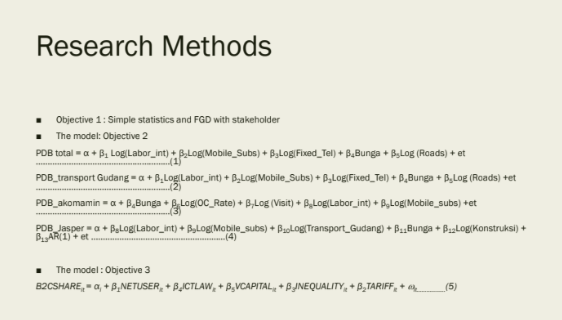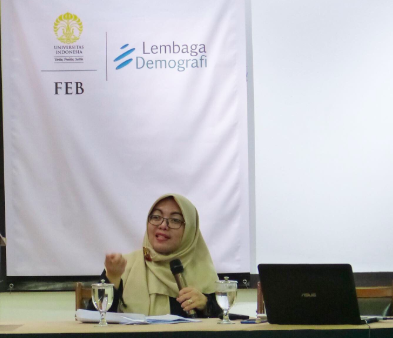The utilization of digital technologiy is believed to significantly boost a country’s economy. In Indonesia, the impact is estimated to be a 3% increase of the annual GDP. However, Indonesia’s high information and communication technology (ICT) imports have contributed to the country’s poor performance in its current account deficit. What is the impact of the digital economy on Indonesia’s balance of payment and the real sector? This question was discussed by Telisa Aulia Falianty (Faculty of Economics and Business, Universitas Indonesia) in an FKP event hosted by Lembaga Demografi FEB UI on Friday, 27 September 2019.
Previous studies have found that an increase in e-commerce transactions has significant impacts on many aspects of economy, such as to company performance, prices, and productivity. Digitalization is also found to reshape the structure and nature of work and shifts the limitation of production. The impacts of ICT on the economy are also found to be more potent in poorer countries.
 Through a combination of qualitative and quantitative methods, this study found that ICT sector has an increasing positive correlation with Indonesia’s GDP. However, as mentioned, this sector also contributes to total service imports, and consequently worsens Indonesia’s current account deficit. To solve this, the government needs to assess cross border import regulations and strengthen the import database, and conduct import-substituting and export-promoting policies.
Through a combination of qualitative and quantitative methods, this study found that ICT sector has an increasing positive correlation with Indonesia’s GDP. However, as mentioned, this sector also contributes to total service imports, and consequently worsens Indonesia’s current account deficit. To solve this, the government needs to assess cross border import regulations and strengthen the import database, and conduct import-substituting and export-promoting policies.
Based on focus group discussions with related stakeholders, Indonesia has the potential to produce ICT products, such as devices in the short term, and applications/softwares in the long term. However, to achieve this, stakeholders say the government needs to create a healthy ecosystem that can protect local startups and improve ease of administration, provide technical and financial assistance, and ensure the protection of intellectual property rights and digital security.
Based on mobile phone subscription as a proxy for ICT utilisation, Telisa also found that ICT most significantly increases the sectoral GDP of the transportation and warehouse sectors. The date also showed that the growth of Business to Consumer (B2C) e-commerce in Indonesia is driven by internet user penetration, the readiness of electronic transaction regulations, and accessibility to venture capital.
For the complete presentation and Q&A session, please refer to the video and materials provided.





